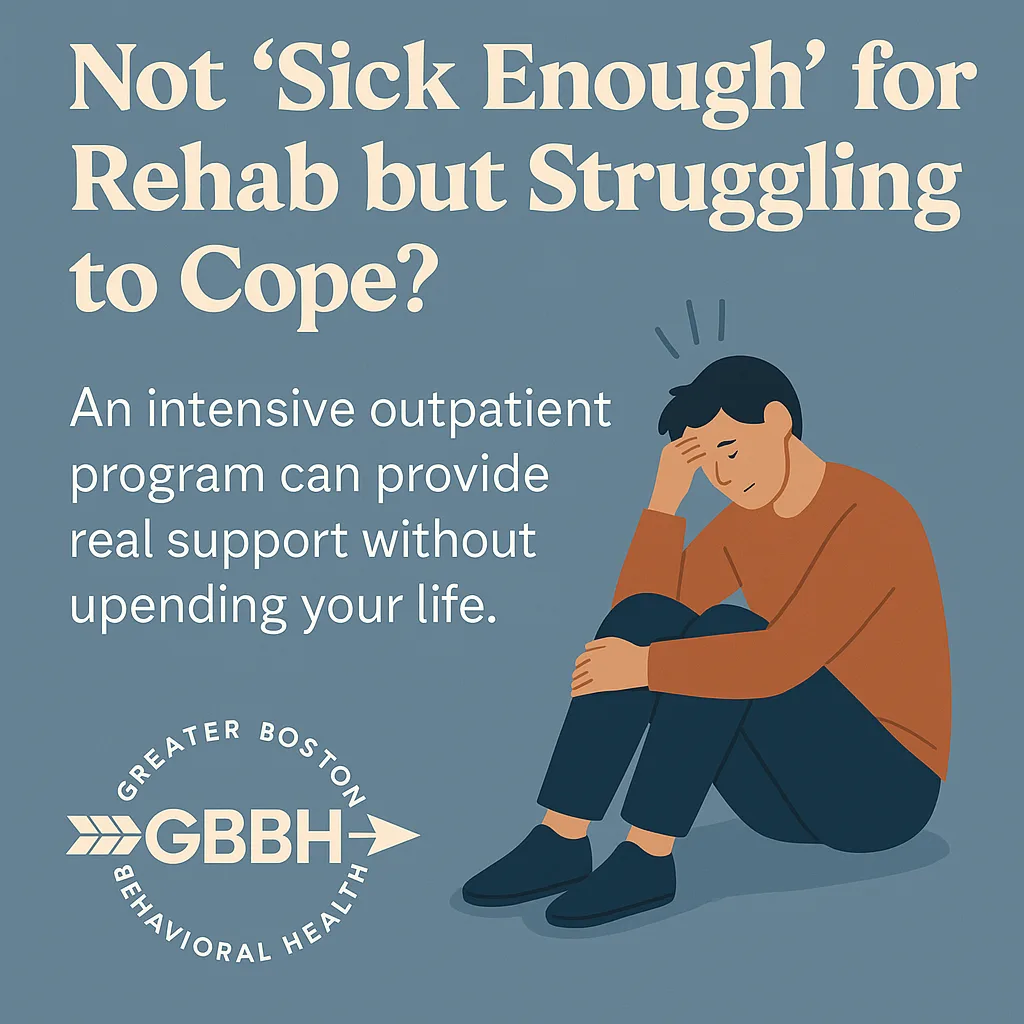Not everyone’s life explodes in obvious ways. Some people spiral outward—loud, messy, undeniable. Others stall out—quiet, contained, hidden behind a calendar full of obligations.
If you’re showing up to work, making your meetings, handling family duties—but privately counting the hours until you can unwind, drink, or escape—you are living in the stall zone. Functioning, but struggling. On paper, you’re fine. In reality, you’re tired in a way that no nap or vacation can fix.
At Greater Boston Behavioral Health, we see you. You are not invisible, and you do not need to crash to deserve help.
When Being “High-Functioning” Becomes a Trap
There’s a quiet trap for high-functioning people: because you can do it all, you feel like you should. Even when it’s costing you everything inside.
You might recognize it in small moments:
- Drinking more after work but telling yourself it’s “normal stress.”
- Skipping meals or workouts because “there’s just too much to do.”
- Feeling irritable, numb, or disconnected even during happy moments.
- Telling yourself, “It’s not that bad. I’m still doing fine.”
High-functioning doesn’t mean healthy. It just means you’ve gotten good at hiding the cost.
You Don’t Need to Fall Apart to Get Help
There’s a dangerous cultural myth that you must hit “rock bottom” before you qualify for help. This belief keeps countless people suffering in silence.
The truth? You are allowed to seek help before your life collapses. You are allowed to choose rest before burnout. You are allowed to ask for support before your world feels unlivable.
This is why options like an intensive outpatient program (IOP) exist. They offer professional care before things get worse—without requiring you to put your entire life on hold.
What Is an Intensive Outpatient Program (IOP), Really?
An IOP is a structured treatment option for mental health, addiction, or both. It’s not a hospital stay. It’s not full-time rehab. It’s a flexible, clinically proven way to receive care while continuing your day-to-day responsibilities.
In an IOP program, you typically:
- Attend therapy sessions 3–5 days per week.
- Participate in both individual and group therapy.
- Receive support for underlying mental health concerns.
- Get access to clinical care while living at home.
IOP works because it’s real treatment without total life disruption. It’s therapy that fits into your reality—not therapy that demands you pause your world.
How IOP Helps When You’re “Too Functional to Be Struggling”
Clients who consider themselves “too functional” often resist help because they fear labels. They fear losing their image of control. But an intensive outpatient program in Boston, MA meets you where you are—with respect, not judgment.
Here’s what IOP offers:
- Structure Without Imprisonment: You stay home. You keep working. But you get structured time each week to process, learn coping tools, and actually heal.
- Clinical Care Without Identity Pressure: You don’t have to identify as an addict or completely broken to qualify. Exhausted and overwhelmed are enough.
- Community Without Losing Independence: Group therapy connects you with others facing similar struggles—without requiring you to uproot your entire life.
IOP is care for people who are holding it together, but no longer want to pretend it’s easy.
What You Might Be Risking By Waiting
Choosing to wait until you “need rehab” comes with costs:
- Chronic stress can develop into anxiety or depression.
- Regular coping through substances can quietly escalate to dependence.
- Relationships can suffer from your hidden irritability or emotional distance.
- Your physical health can decline from stress-induced habits.
The longer you hold the mask, the heavier it gets.
There’s Strength in Choosing Help Early
If you’ve been asking yourself, “Is it bad enough?”—the fact that you’re asking is a sign to check in. The best time to get help is before your life burns down.
Think of IOP as a pressure release valve:
- You get to stop performing for a few hours a week.
- You can talk honestly without fear of judgment.
- You invest in yourself before things fall apart.
At Greater Boston Behavioral Health, we see people reclaim their lives not because they were forced to—but because they chose to step back before the crash. If you’re near Boston, Dedham, Waltham, Needham Massachusetts, GBBH offers programs with that same approach.
Common Questions About IOP When You’re High-Functioning
Is IOP really enough if I’m struggling but still working?
Yes. IOP is designed exactly for that scenario—helping people stabilize before things get worse. Many clients continue working while attending IOP sessions, and most experience improvements in their professional and personal life because of the support.
Will my employer or family have to know I’m in treatment?
Not unless you choose to tell them. IOP sessions are typically scheduled around work hours, and your participation is confidential under HIPAA. You control who knows.
What if I feel like I’m not ‘sick enough’ for treatment?
That’s the conditioning talking. We don’t measure suffering by catastrophe. If you’re tired, emotionally worn, or caught in unhealthy patterns, you deserve care.
Do I need a formal diagnosis to join IOP?
Not necessarily. Our clinicians will complete an assessment to see if IOP is clinically appropriate for you. You don’t need to label yourself before reaching out.
Is there a local program in Boston where I can get started?
Yes, Greater Boston Behavioral Health offers IOP services locally in Boston, Massachusetts. Learn more about our mental health IOP program in Boston and get personalized information about your next step.
You Don’t Need to Prove You’re Broken to Get Help
You’re not imagining it. It is exhausting to live two lives—one where everything looks okay, and another where you feel like you’re barely holding it together.
You don’t need to be falling apart to want peace. You don’t need to be at rock bottom to want to feel better. You just need one decision—to stop carrying it all alone.
Talk to Someone Who Gets It
Call (888) 450-3097 or visit to explore our intensive outpatient program services in Boston, Massachusetts. Let us help you build relief into your life—before it’s urgent.


